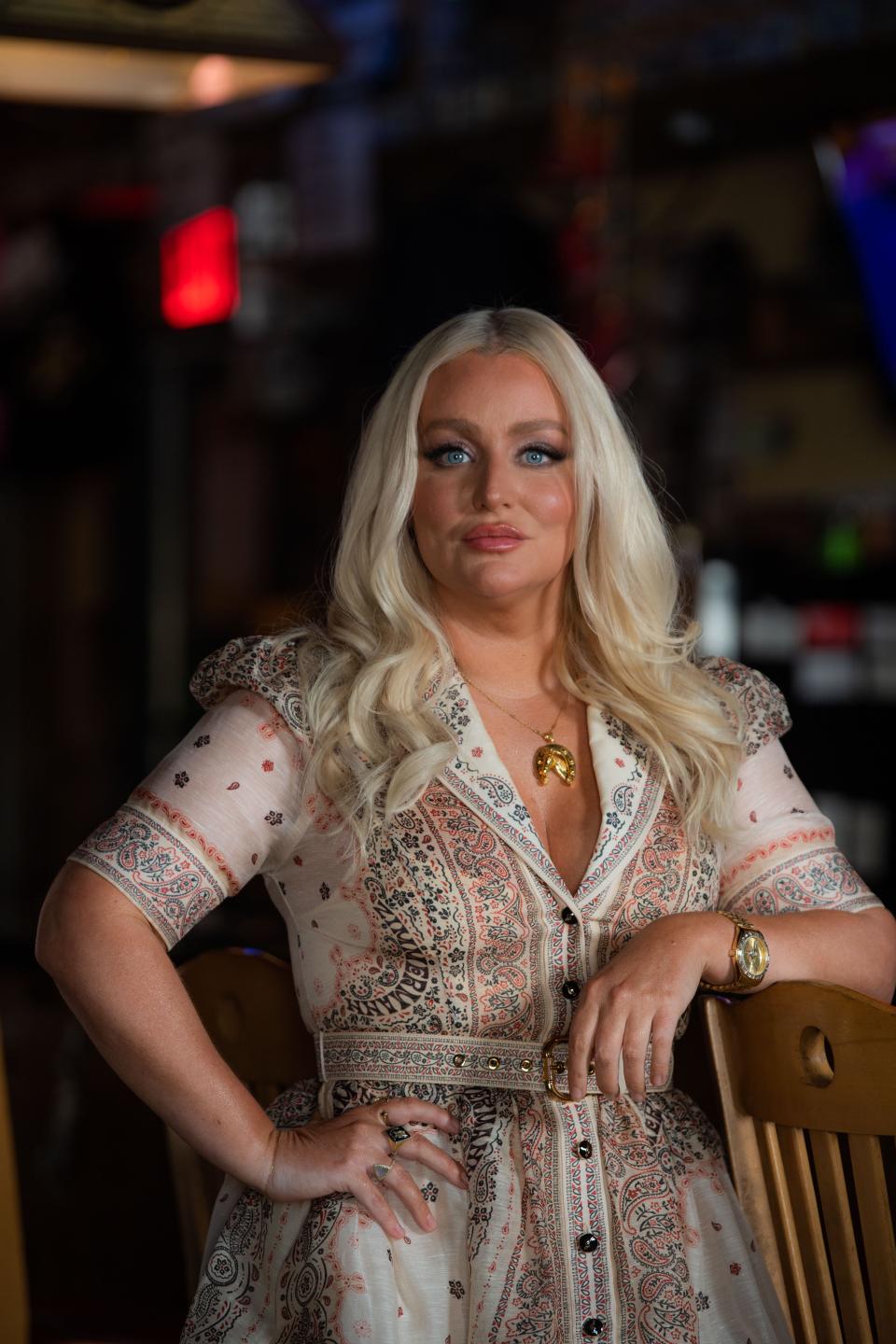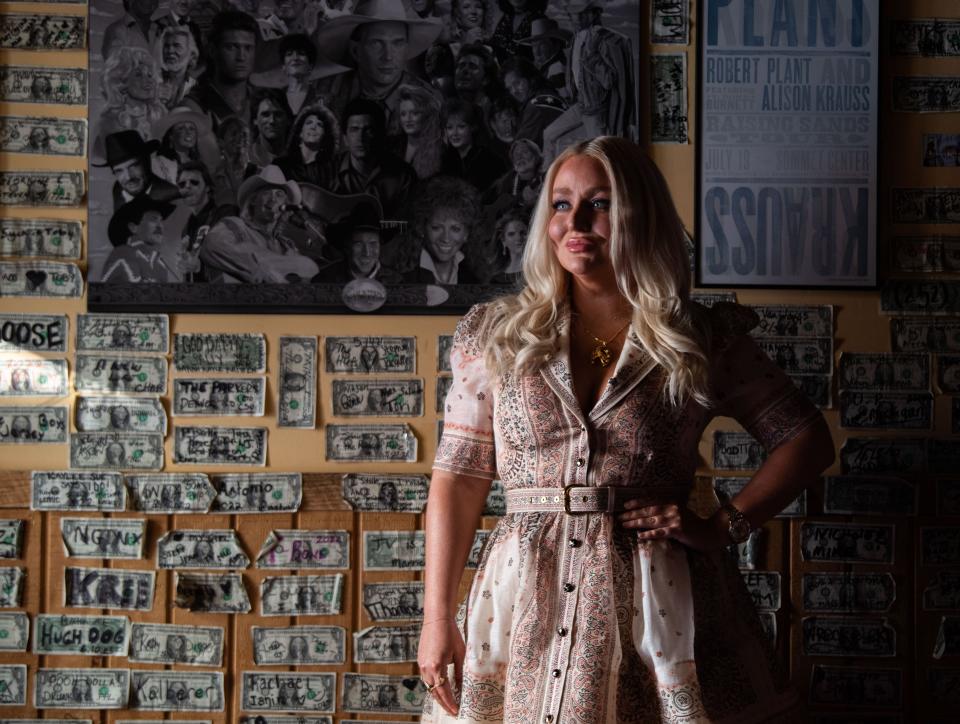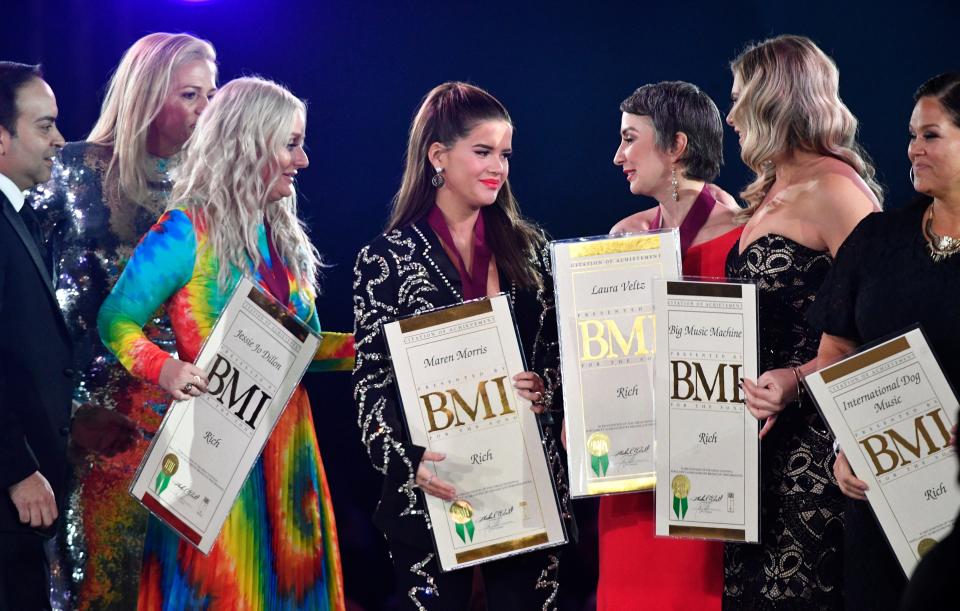Jessie Jo Dillon's Grammy-level songwriting aims to uncomplicate human emotions
- Oops!Something went wrong.Please try again later.
- Oops!Something went wrong.Please try again later.
- Oops!Something went wrong.Please try again later.
- Oops!Something went wrong.Please try again later.
On Sunday, Jessie Jo Dillon will be the only songwriter nominated for Grammy's Songwriter of the Year, Non-Classical award, whose lineage includes a parent responsible for writing no fewer than three songs that can make stadiums of grown men cry before the first chorus.
While in conversation with The Tennessean at midtown Nashville's Bobby's Idle Hour bar, Dillon's platinum-blonde hair illuminates against the midday sun filtering through a window that's at least three decades old. Simultaneously, her bright, wide-eyed stare is filled with dread-tinged wonder.
No, that dread's not attached to attempting to mimic her father Country Music Hall of Famer Dean Dillon's success with tear-jerking songs, including multiple artists' takes on "Tennessee Whiskey," George Strait's "The Chair," and Keith Whitley's "Miami, My Amy."
It's more existential than that.
"Life is a sad, dark comedy," says Dillon with a chuckle.

The ability to both fully engage with and wholly divorce herself from a "glass half empty" mentality is the easiest way to highlight how, in the past half-decade, she's able to co-write Dan & Shay's billion-streaming Justin Bieber collaboration "10,000 Hours" as well as Jelly Roll's "Halfway to Hell," Megan Moroney's "Girl in the Mirror" and Maren Morris' "Rich."
She describes songwriting as the art of using words to uncomplicate human emotion.
Lyrics from Moroney's "Girl in the Mirror state the following:
"The girl in the mirror used to know who she was / Now she's up wondering why she's not enough / He put out her fire in the name of young love / The girl in the mirror used to know who she was."
From Napster and Connor Oberst to Grammy-nominated success
Impressively, Dillion is equally adept at writing tunes similar to those explored by stars of her father's early-era work like Waylon Jennings and Willie Nelson, plus mega-streaming lighter fare that feels similar to Country Music Hall of Fame songwriter Bob McDill's work on Bobby Bare's 1980 classic "Song of the South."
She discusses the importance of artists like Jelly Roll in navigating the narrow space between heavier and lighter sounds and subject matter in modern country music.
"I hate it when record executives tell me to write songs that appeal to what 'Bubba at Walmart' would want to hear," she says. "Expectations have changed."
Pop music's evolution into an abstract concept requiring frank lyricism to correct its course is a movement that's taken 25 years to arrive again.

Dillon, 36, was 13 years old when the rise in downloading portals like Napster democratized access to music. The impact? Young music consumers became bigger fans of artists and their vibes than arbitrary sound-related genres.
By the time she was 16, she was soundtracking being raised amid a "gasoline and matches" type relationship between her now-divorced mother (music executive Kenni Wehrman) and father, and illegally downloading songs like Connor Oberst-led emo-folk band Bright Eyes' "Lover I Don't Have To Love."
The bittersweet 1970s- and 1980s-era catalogs of the Rolling Stones (she name drops "Beast of Burden" and "Wild Horses"), plus the solo and Eagles-related catalog of Don Henley ("Boys of Summer") also provided influential.
However, unlike millions of other youths using an array of singles to glean unique musical perspectives during the era, Dillon was further impacted by being raised when her father was penning George Strait classics like "Ocean Front Property," "Nobody in His Right Mind Would've Left Her" and "It Ain't Cool To Be Crazy About You."
Moreover, her mother was simultaneously achieving success as an executive at Warner Bros. Records with works by the trio of Emmylou Harris, Dolly Parton and Linda Ronstadt, plus singles like Randy Travis' "Forever and Ever Amen," Hank Williams Jr.'s "Born to Boogie" and Nitty Gritty Dirt Band's "Fishin' in the Dark."

"It's wild. I believe I was born into whatever magic was in the air around my parents back then," says Dillon with a self-effacing smile.
Influences and inspirations of songwriter superstardom
Songwriters like fellow 2024 Grammy nominees Shane McAnally and Brandy Clark, gifted at writing songs of dark, light, easy, hard and all-genre varieties, also arrived in Music City at the turn of the 21st century.
Dillon represents a generation of Nashville songwriters who dig deeper into Clark and McAnally's embrace of the pop, rock and Southern hip-hop that defined Jessie Jo's turbulent iTunes and peer-to-peer downloading teenage years.
"Really deep people wrote airy music — that still carried a deep message," says Dillon about Clark and McAnally's hit work of the past two decades. That includes Miranda Lambert's "Mama's Broken Heart," Kacey Musgraves' "Follow Your Arrow" and "Biscuits," Sam Hunt's "Body Like a Back Road," Midland's "Drinkin' Problem" and Ashley McBryde and Carly Pearce's duet "Never Wanted To Be That Girl."
"Follow Your Arrow" still exists as the North Star moment insofar as Music Row's embrace of progressive LGBTQ politics, while few modern songs are as angsty or bittersweet as "Mama's Broken Heart" or "Never Wanted To Be That Girl."
However, concerning the rest of Clark and McAnally's catalog of most impactful hits, Dillon — who counts crafting genre-expanding sad-girl elegies for Megan Moroney and bad-man redemptions for Jelly Roll in her current creative wheelhouse — offers a note-as-lesson learned:
"Even if 'Body Like a Back Road' doesn't seem lyrically deep, Shane's commitment to writing a pure R&B song that kicks down the (metaphorical) door of country's format (is important)."
When asked about goals beyond 2024's Grammy Awards, the passion fueling the next era of her career emerges.
"I'm helping to create a diverse country marketplace where humanity's complexities are honestly and uniquely captured. The beauty of being a songwriter is tied to revealing true emotions and making people who love music feel shared emotions."
This article originally appeared on Nashville Tennessean: Jessie Jo Dillon's road to Grammy-level songwriting success

